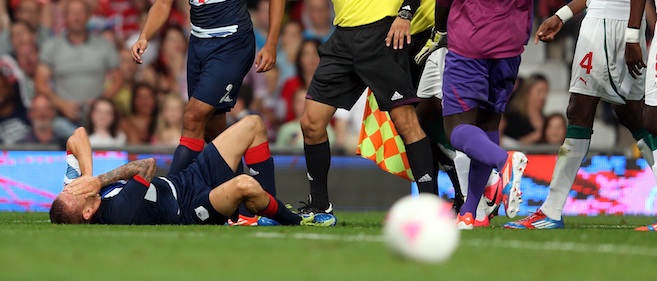Whatever’s wrong with Olympic soccer, let’s hope it’s not fixed
Football pundits are buzzing about an uncalled trip during a tie game
during the Men’s Football first round Group A Match of the London 2012 Olympic Games between Great Britain and Senegal, at Old Trafford on July 26, 2012 in Manchester, England.
Share
 Football pundits here are buzzing—okay, howling—this morning about Britain’s 1-1 result against lower-ranked Senegal, due to an uncalled trip late in the game that should have given the hosts a penalty kick and, presumably, a first-round win.
Football pundits here are buzzing—okay, howling—this morning about Britain’s 1-1 result against lower-ranked Senegal, due to an uncalled trip late in the game that should have given the hosts a penalty kick and, presumably, a first-round win.
The oversight was the coup de grace in game marred by rough play on the part of the Senegalese, to which Uzbek referee Ravshan Irmatov was curiously oblivious. “I don’t know how many fouls their No. 10 [Sadio Mane] had, but in a Premier League game he’d probably have been sent off three times,” Brit midfielder Ryan Giggs complained afterward.
No one’s accusing Irmatov of misconduct. But watch Saliou Ciss’s hack on British forward Craig Bellamy, and you can understand why rumours persist that match-fixers are sniffing around the Olympic tournament as surely as they have every other level of the beautiful game.
Declan Hill, the presiding world expert on soccer corruption, weighed in before yesterday’s game, assuring his blog readers that the fixers are in London doing their best to shave points and set results.
Hill, a Canadian who has lived in Britain, has no proof. But his speculation is well-informed: he’s one of the few non-criminals to have crawled inside the seedy world of Asian gambling and its global match-rigging apparatus. His 2009 book The Fix chronicled how organized criminals seek to influence the scores even of under-17 and under-20 games on the other side of the world, then reap big winnings in betting rings in Manila and Bangkok (the Olympic men’s event is a modified under-23 tournament; the women’s has no age restriction).
“Surely, no athlete would want to ruin their chances of Olympic glory,” Hill stated mockingly on his blog, before adding:
Try not to be naïve. In the Olympic soccer tournament there are only a few teams that have any chance of gaining a medal, let alone winning the whole thing. Any realist connected with sport knows that fact. They also know that the players will be running into sold-out stadiums, the games will be broadcast to hundreds of millions of people around the world and that someone, somewhere, is making a lot of money from the sponsors, but that often those people are not the athletes who are actually playing the game. Add to this that many of the athletes and referees are poor people from poor countries who have few chances in their careers to make good money and when they do, often their own sports officials deprive them of a proper reward.
This is the key dynamic that drives sports corruption – exploitation of the players/referees – until it stops fixers can reasonably expect that some of the athletes/referees will listen to them.
It would be easy to wave away Hill’s warnings if he hadn’t been right about fixing of exhibition games in advance of the 2010 World Cup in South Africa. Or if the fixers hadn’t been trying to rig matches at the 2004 Olympics in Athens. Or if European soccer hadn’t been rocked by a series of rigging scandals that reached the highest echelons of the sport.
Olympic organizers were worried enough that they assigned a security team to the task of keep match-riggers away from athletes and officials.
Again, no one’s pointing fingers at players, managers or officials involved in the Britain-Senegal game.
But Irmatov could do a lot to ease fears by getting things right in his next outing.